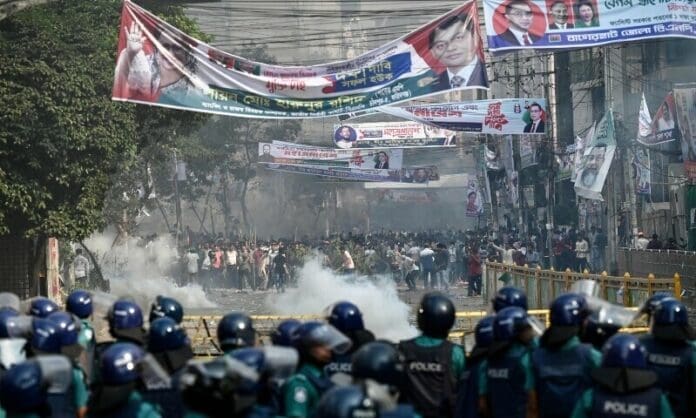A massive protest in central Dhaka turned violent on Saturday as police used tear gas and rubber bullets to disperse the crowd of opposition supporters. The protesters, numbering more than 100,000, were demanding the resignation of Prime Minister Sheikh Hasina to ensure a free and fair election under a neutral government. The clashes resulted in one police officer being killed and over 100 people injured. Live footage showed thousands of people running for safety as sound grenades exploded and black smoke filled the air. The violence escalated as both the police and the protesters engaged in confrontations, with the police firing tear gas and rubber bullets while the protesters threw stones and bricks. The protests, organized by the Bangladesh Nationalist Party (BNP) and the Jamaat-i-Islami, were the largest in the country this year and come ahead of a general election scheduled in three months. Sheikh Hasina, who has been in power for 15 years, is facing accusations of corruption and human rights abuses, despite overseeing rapid economic growth. At least 20 people were admitted to the hospital with injuries caused by rubber bullets. The clashes began near the largest Catholic church in the city when opposition supporters allegedly torched a bus and a police post. The BNP has called for a nationwide strike on Sunday to protest the violence. The opposition has been protesting for months, even though the BNP’s leader, Khaleda Zia, is effectively under house arrest after being convicted of corruption. Despite the government’s efforts to detain opposition activists, supporters of Khaleda Zia poured into Dhaka by crossing checkpoints and riding on packed trains. At least 10,000 police officers were deployed to control the situation. The BNP claimed that over one million people attended its rally, while the police estimated the total number of protesters to be around 100,000. The Jamaat protest, which was banned by the police, attracted around 25,000 people near the city’s main commercial district. The BNP has threatened to escalate their protests, including strikes and blockades, if Prime Minister Sheikh Hasina does not voluntarily resign. Concerns have been expressed by Western governments over the political climate in Bangladesh, where Hasina’s ruling party dominates the legislature and the security forces are accused of human rights violations.
Home English Newspaper World: Bangladesh Police Disperse Anti-PM Protest Using Tear Gas and Rubber Bullets
